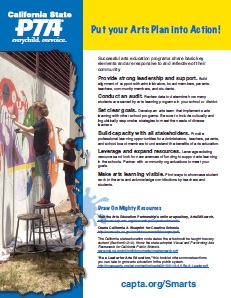 Successful arts education programs share basic key elements and are responsive to and reflective of their community. The time is now to encourage your school district to look at arts education as a significant strategy to address student engagement and achievement in California schools. Download, print and share this great resource with parents, families, administrators and your school community.
Successful arts education programs share basic key elements and are responsive to and reflective of their community. The time is now to encourage your school district to look at arts education as a significant strategy to address student engagement and achievement in California schools. Download, print and share this great resource with parents, families, administrators and your school community.
Archives: Resources
Family Engagement Practices in CA Schools
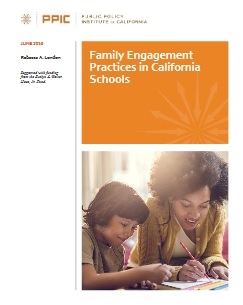 A recent report by the Public Policy Institute of California (PPIC) identifies promising family engagement strategies from a review of 15 high-need districts in the state, noting that effective strategies are culturally appropriate and aim to support student learning at home.
A recent report by the Public Policy Institute of California (PPIC) identifies promising family engagement strategies from a review of 15 high-need districts in the state, noting that effective strategies are culturally appropriate and aim to support student learning at home.
Univision Contigo: Clave al Éxito

Guía Educativa Para Padres
Usa esta guía para involucrarte en las diferentes etapas de la educación de tus hijos, sigue su progreso, comunícate con sus maestros, y prepáralos para triunfar en la universidad y en el mundo laboral.
Assessments: Smarter Balanced Infographic
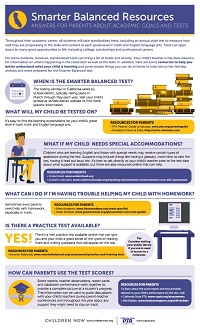 A new infographic from California State PTA offers resources and information on frequently asked questions on the new student assessments.
A new infographic from California State PTA offers resources and information on frequently asked questions on the new student assessments.
Download and share copies today!
School Smarts: ‘A Lifetime of Knowledge’
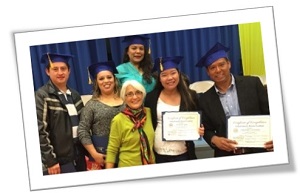 Wendy Smithers (at right in scarf) is a School Smarts Parent Engagement Program facilitator. She was honored to share her personal and professional experiences at a recent California Association of Bilingual Education convention.
Wendy Smithers (at right in scarf) is a School Smarts Parent Engagement Program facilitator. She was honored to share her personal and professional experiences at a recent California Association of Bilingual Education convention.
How many of you are teachers? Paraprofessionals? Parents? Today I would like to share with you my experiences as a facilitator of the School Smarts Parent Engagement Program and its connection to the arts. A recent PTA newsletter clearly stated that family engagement is the number-one predictor of student success.
Family engagement has a big impact on improving student outcomes and building connections between the home and school. As a facilitator of School Smarts I can share with you the many success stories of parent involvement and student achievement.
Motivation and Inspiration
I have facilitated School Smarts several times in South San Francisco and Millbrae. Each time, my heart sings with motivation and inspiration from the parents. It’s about making the connections with the parents from school to home and back. Just like in your classroom, you see the children’s smiling faces, hands eagerly raised, I have experienced the same with parents. They nod, smile, talk amongst themselves. At the end of each session, they hug you and thank you for the new information learned. And they laugh! You know you are making a difference when you connect with them and they respond back so eagerly.
School Smarts has seven sessions and one wonderful graduation. Session One begins with sharing family values, and education is always one value that comes up as most important to the parents. Because it’s an important value, we talk about how to set up your home for homework and how important it is to turn off the screen time and video games Monday through Thursday. And because they value education, the parents try it and follow through.
The results are astonishing! By the second session, about 99 percent of the parents are onboard with turning off screen time and reorganizing homework time! Then I ask them to be sure to look in their child’s backpack every night. They think this is so funny – until the next week, when they share that they did look in the backpacks and they discovered incomplete homework and notes from the teacher and school. We now have empowered parents! They are onboard to make changes and connect to school.
 As a facilitator, I observe as parents discover and grow within each of the seven sessions. Communication skills become stronger. They begin to talk more with each other, ask questions – and they realize the teacher is available to talk with them. They realize the door to the classroom is open to them. They become motivated to communicate with the teachers. They share their experiences:
As a facilitator, I observe as parents discover and grow within each of the seven sessions. Communication skills become stronger. They begin to talk more with each other, ask questions – and they realize the teacher is available to talk with them. They realize the door to the classroom is open to them. They become motivated to communicate with the teachers. They share their experiences:
- “Teacher, my son really loved his homework!” or
- “Teacher, can you please help my child with the word problems?” or
- “Teacher, I have set up a homework system at home!”
Instead of ignoring the problem, or not talking to the teacher, parents are confident to ask for help.
As you probably know, in many Latin countries, the parents never enter the school. They walk their child to school, but never enter. They hang out at the front of the school. You probably see this at your school. The parents hang out at the entrance, but are unaware they can go into the classroom. School Smarts builds their confidence to not only visit the classroom, but also to talk, question and share with the teacher. Now the seeds of the home-school connection have been planted and are growing.
I have always found it is important to really know your audience. Do they understand the Core standards? Can they navigate and interpret the new standards-based report card? Do they have good questions to ask at conference time? Do they understand the educational system in California? These are questions I ask myself as I prepare for each session. As a facilitator, I want to teach new concepts that the parents need to know and empower them with new knowledge.
Just like your students, parents work best in small groups where they can share and build communications skills. Having understood the Core standards, many parents now form well-though-out conference questions:
- “In what areas is my child proficient or exemplary?”
- “What can I do at home to increase his mastery of standards?”
- Or sharing with the teacher the homework routines set up at home.
Parents are proud – and knowledgeable. It is exhilarating to see parents becoming empowered and participating in their child’s education. School Smarts gives them these skills.
The Power of Art
Art is also a critical component in School Smarts. It is with the art projects that they realize how important art is for their children. Art is a tool which allows all children to show what they know — to model high levels of comprehension in all subjects. You have seen the difference with your ESL students when they can illustrate the beginning, middle or end of a story. They can demonstrate their comprehension of stories read, the details, word meaning, sequencing, main idea with details, character description, cause/effect, dialogue: all through art, at any grade level. It is with art that all students can demonstrate what they know as they learn English. And art is a cross-cultural medium – there are no language barriers. When the students create projects at home, the whole family participates. We all benefit from the diversity and cultural impact shown in the art.
 It is through the power of art that meaning and comprehension shine. Cultural ties are revealed through art. Family art projects form the home-school connection. At School Smarts, the parents participate in an art project almost every session. We celebrate the parents’ art by hanging it up in the school cafeteria or halls. Children delight and are proud of their parents’ art – they beam with pride:
It is through the power of art that meaning and comprehension shine. Cultural ties are revealed through art. Family art projects form the home-school connection. At School Smarts, the parents participate in an art project almost every session. We celebrate the parents’ art by hanging it up in the school cafeteria or halls. Children delight and are proud of their parents’ art – they beam with pride:
- “My mom and dad go to school!”
- “My mom made this of me!”
- “My dad volunteers in school!”
And because their parents attend School Smarts, the children find themselves improving more in class as well: improving in grades and subject matter. Education is valued. Children excel. Family engagement is a predictor of student success.
Community is built through art, and with it the development of stronger communication skills. I once asked a kindergarten parent how will she make sure her kindergarten student masters the Core standard of identifying geometric shapes. She thought about it and answered, “I will point out the shapes of street signs as we walk to school.” Brilliant! Talking to her child and observing the environment; making connections to school curriculum. She will take control and be sure her child masters this standard. She has knowledge of these core standards at each grade level and understands how the school and home work together to build success.
The Home Benefits, the School Benefits, the Community Benefits
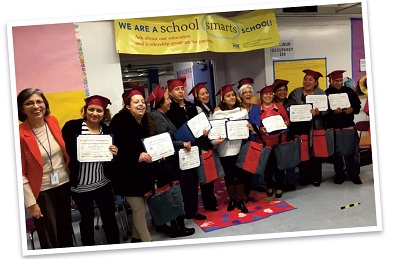 Parents grow and find themselves, not just good communicators, but now they are leaders in the school community and advocates for education at their school sites. Parents are empowered to not just join PTA, but to attend meetings and participate! They join other committees and volunteer in school. As leaders, they understand how important it is to be involved in education. We tell them this from kindergarten through 12th grade! And it’s not IF you go to college – it’s WHEN YOU GO. Parents speak at school-board meetings. Parents also apply this new knowledge and find themselves advancing in their jobs or going back to school. Many parents have been inspired to get their GED or take courses in English – even going to college and graduating! New life goals are made and a future for them and their children moves forward.
Parents grow and find themselves, not just good communicators, but now they are leaders in the school community and advocates for education at their school sites. Parents are empowered to not just join PTA, but to attend meetings and participate! They join other committees and volunteer in school. As leaders, they understand how important it is to be involved in education. We tell them this from kindergarten through 12th grade! And it’s not IF you go to college – it’s WHEN YOU GO. Parents speak at school-board meetings. Parents also apply this new knowledge and find themselves advancing in their jobs or going back to school. Many parents have been inspired to get their GED or take courses in English – even going to college and graduating! New life goals are made and a future for them and their children moves forward.
At the end of the Seventh Session, we ask parents to make a goal that they can fulfill and hopefully demonstrates leadership and advocacy in the school community. Many parents join PTA! And they attend meetings! They begin to participate and find their voices. Other parents promise to read to their child every night. Families together: Friday pizza night with families in their pajamas and on the couch reading together with no TV!
They also set goals to always check their backpacks every day, too! What was so funny in the beginning has become a way of life! I love it. Setting goals gives them a reason to participate and become involved with their child’s education.
Many parents become inspired to share their career with the school. One graduate – a dentist – gave dental-hygiene education to each kindergarten through fifth grade class at one school. This was an incredible give-back to the community. The kids loved his big model of teeth that demonstrated how to properly brush their teeth! Other parents got fingerprint clearance and TB-tested to become legal volunteers at school. At one school, the PTA was losing its charter – the parents’ goal was to increase membership. They organized themselves to work in partners and signed up for different times of the school day to meet and talk with parents to join PTA. Membership increased to 75 parents! And the graduates of School Smarts were elected to the executive board! At another school recently renovated, parents worked with the art teacher and classrooms to construct tile murals for the new hallways! Gardens and raised beds appear as parents work with teachers and students to build stronger school community. As we say, “Si se puede – it can be done!”
Graduation is another emotional, momentous event. In some school graduations, mortarboards are purchased, parents walk down a red paper carpet to the stage with “Pomp and Circumstance” playing in the background. For many, this is their first graduation. Tears are in their eyes. Mine, too. The children sit silently, in awe of their parents. They too will graduate. Family pride – valuing education – building a future.
Because of School Smarts, parents are moving forward. Families are moving into the future with educational goals. Parents communicate well, demonstrate leadership and advocacy for all kids in education. Parents become leaders and families achieve. The rewards are a lifetime of skills and knowledge. They have started a change at home that will continue after their children are grown.
The home benefits, the school benefits, the community benefits – across all cultures and languages. School Smarts is a program which gives our parents and their children a future. It builds home-school connections through art, communication, leadership and advocacy. Thank you!
Do you have a family-engagement success story to share? Email communications@capta.org.
La PTA del Estado de California patrocina el Proyecto de Ley 2680 (Bonilla) para fortalecer la participación de los padres
 La participación de los padres es el factor principal de éxito de los estudiantes. Es por eso que la PTA de California patrocina el Proyecto de Ley 2680 de la Asambleísta Susan Bonilla (D-Concord). Este proyecto de ley demuestra un compromiso con la conexión de las familias, las escuelas y las comunidades para mejorar los resultados de los estudiantes.
La participación de los padres es el factor principal de éxito de los estudiantes. Es por eso que la PTA de California patrocina el Proyecto de Ley 2680 de la Asambleísta Susan Bonilla (D-Concord). Este proyecto de ley demuestra un compromiso con la conexión de las familias, las escuelas y las comunidades para mejorar los resultados de los estudiantes.
El designar la inversión de capital inicialmente para que los distritos escolares desarrollen estrategias de participación de los padres: Con AB 2680 podremos:
- Fortalecer y fomentar una activa y verdadera participación de los padres, estudiantes y familias para establecer y actualizar la Fórmula de Control Local de Fondos y el Plan de Control Local y de Rendimiento de Cuentas (LCAPs)
- Capacitar a los padres, estudiantes y familias a convertirse en lideres activos en las comunidades escolares por medio de entrenamientos a nivel escolar y de distrito
- Fomentar la participación de los padres, apoyar a los padres como los primeros maestros de sus hijos y a motivar a los padres a abogar por una educación de calidad para sus hijos y todos los niños.
Es hora de incluir a todos los padres y familias para el éxito de nuestros estudiantes, nuestras escuelas y nuestro estado.
Este pendiente de la próxima información para que usted pueda ayudar a seguir con el esfuerzo de la participación de los padres, y ¡ asegúrese de compartir sus historias de éxito de participación de los padres con nosotros para que podamos correr la voz en el Capitolio, en nuestras comunidades y en todo California!
Gracias por todo lo que hace por nuestros niños – hace la diferencia.
PARA OBTENER MÁS INFORMACIÓN SOBRE AB 2680 Y PARTICIPACION DE LOS PADRES
Student Ella Smith: The Importance of Family Engagement
Family Engagement’s a Team Effort in Pomona Unified School District
Four years in, School Smarts is making a difference
 A family-engagement movement is taking place in Los Angeles County, and parents like Maggie Uceda are proud to be a part of it.
A family-engagement movement is taking place in Los Angeles County, and parents like Maggie Uceda are proud to be a part of it.
As a volunteer at Pomona’s San Antonio Elementary School, Uceda already was familiar with the school community. But when she heard about California State PTA’s School Smarts Parent Engagement Program from her principal, it definitely got her attention.
“I first heard about School Smarts when the principal brought the program to San Antonio,” she said. “It was a new program, and we were the first ones in the district to try it. She asked me to participate in the class and bring my friends, so we took the very first School Smarts class. From there, it took off!”
With the School Smarts academy, Uceda enjoyed learning more about how to advocate for her children – as well as all children in her school community.
“Our grandparents always taught us values when we were young,” she said. “Now, as a mom, this is something that is important to me. I know that it is my turn to teach my children these values because School Smarts taught us that parents are the first teachers of our children.”
But learning about advocacy and engagement and becoming more involved as a parent wasn’t enough for Uceda: She was so inspired by her experience that she trained to become a School Smarts facilitator. In that new role, she finds personal reward in motivating other parents and family members to reach goals big and small, and to have a true voice in their children’s school and the surrounding community.
“For me, being a successful parent is being involved with my children’s school.”
EMBRACING ENGAGEMENT
Uceda is just one of the growing number of dedicated Pomona Unified School District School Smarts graduates. Since its beginning four years ago as one of the first School Smarts programs in the state, School Smarts has been embraced at all levels of the district to not just engage, but to empower families.
While the district had used an introductory parent-engagement program for some time, Diana Marmolejo-Reymundo felt something was missing. As district coordinator of pupil, community and employee relations, Marmolejo-Reymundo and others believed more in-depth, meaningful training and engagement was needed to support Pomona students and the diverse family community. The challenge was finding the tools for success.
“The programs we have used in the past were missing a key element – the next step!” she said. “School Smarts offered a solution by building the capacity of parents by empowering, training and supporting them to take the lead with a solid program and curriculum that focuses on how to help parents help their children.”
“It’s about being partners in education,” added PUSD Superintendent Richard Martinez. “We wanted to create an atmosphere and environment supportive to schools and parents. It’s so much more than just helping out in the classroom.”
So when district and parent representatives heard about School Smarts, excitement followed.
Lynn Miyamoto was serving as First District PTA president when California State PTA launched School Smarts as its premier parent-engagement program. She had heard about the new program at a California State PTA meeting, where she and other participants learned that the search was on for the first academy locations. Miyamoto and other PTA volunteers like Pomona Council PTA President Steve Richmond brought the idea to the school district, which became interested and worked to incorporate the engagement program.
“We started to see that the district and community really embraced School Smarts,” said Miyamoto, who currently serves at California State PTA’s School Smarts chair. “Now we’re doing train-the-trainers and graduates like Maggie are becoming facilitators. We’ve seen it grow by leaps and bounds!”
Marmolejo-Reymundo noted the pure team-effort success of the program, which is supported by the board of education, superintendent, district staff, principals, teachers, school staff, PTA Council, First District PTA, school-site councils, parents, students and community members. She offered advice for other districts seeking to do the same.
“Build on success, reflect constantly, hear and value the voices of all including the critical ones, continue learning and, above all, remember that parents are valued partners,” she said. “Allow the strength of School Smarts to percolate and you will see how it will permeate into the hearts of others.”
‘EXACTLY WHAT WE HOPED FOR’
Martinez attends School Smarts graduations and events, where he sees family engagement and empowerment in person.
“The kids who come to their parents’ graduations are so excited – you see it in their faces!” he said. “There’s a ripple effect: Our kids are learning something that they must accomplish because their parents did it, too. The effect on children and families is in the classroom and beyond.”
“I was blown away – we started to see that the district really embraced it,” said Miyamoto. “Before, the schools had been struggling, but now parents and families were engaged. That’s exactly what we hoped for.
“Welcome parents and empower them to be engaged with their schools and their kids: Pomona Unified School District and School Smarts are doing it!”
SCHOOL SMARTS IN POMONA UNIFIED SCHOOL DISTRICT: BY THE NUMBERS
- PUSD program start date: 2012
- First PUSD School Smarts program: San Antonio Elementary School in Pomona
- Current number of academies and programs: 15 academies at 9 schools
- Current number of district facilitators: 7
- Graduates to date: 340
- Languages: School Smarts offered in all 6 available School Smarts curriculum languages in PUSD.
Arts-Education Strategies in California LCAPs
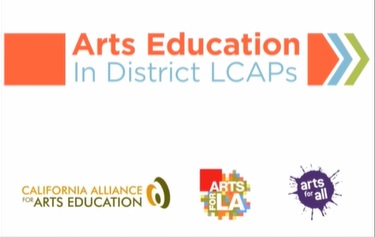 The Local Control Funding Formula (LCFF) offers historic opportunities for school districts to set new, locally-driven priorities aimed at improving outcomes for students who are often underserved in public schools. Arts education aligns with LCFF goals and contributes to a set of unique skills and outcomes that are shown to help students succeed in school and in life.
The Local Control Funding Formula (LCFF) offers historic opportunities for school districts to set new, locally-driven priorities aimed at improving outcomes for students who are often underserved in public schools. Arts education aligns with LCFF goals and contributes to a set of unique skills and outcomes that are shown to help students succeed in school and in life.
In the coming weeks and months, districts will be updating their Local Control Accountability Plans (LCAP) to determine priorities and funding for the coming years. The California Alliance for Arts Education in partnership with Arts for LA and LA County’s Arts for All has created a set of materials and trainings to empower advocates to contribute to these important conversations, educating officials about the benefits of arts education. Here are helpful advocacy materials courtesy of the California Alliance for Arts Education, of which California State PTA is a member:
- Arts Education Strategies in California LCAPs
- 5 Examples of Arts Education in District LCAPs
- Customizable Powerpoint for 3-minute school board presentations
- Script for 3-minute school board presentation
- Leave behind flyer for school board presentation
- En Espanol: Leave behind flyer for school board presentation
- Sample Letter to Local School Board, Example of personalized letter
- LCAP Template: Arts for LA, Arts for All and the California Alliance for Arts Education collaborated to develop an LCAP template that offers concrete examples of how districts can implement arts education strategies to improve student outcomes.
For more information and materials, visit the California Alliance for Arts Education’s LCFF Toolkit.
EdSource: Updated Guide to LCFF
 Welcome to an updated guide to the most sweeping changes in more than a quarter-century affecting how California schools are governed and funded: the Local Control Funding Formula. This guide by EdSource looks at the law two-plus years into its implementation and offers:
Welcome to an updated guide to the most sweeping changes in more than a quarter-century affecting how California schools are governed and funded: the Local Control Funding Formula. This guide by EdSource looks at the law two-plus years into its implementation and offers:
- A full explanation of how the formula works
- A 9-question primer on the Local Control Funding Formula, en español también
- A tool that allows you to compare how much money school districts will receive under the formula;
- A short history of school finance reform in California
- A look at how California’s school spending compares with other states with the “States in Motion” guide.